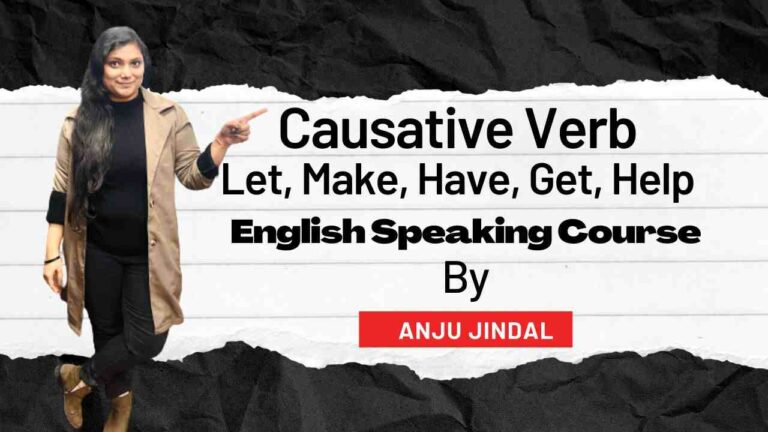
Causative Verb: Let, Make, Get, Have, Help-English Speaking Course
Firstly, When we talk about grammar, I often encounter the following questions:
When to use Help, Let, Make, Get, and Have?
What are they called moreover?
We will certainly learn about causative verbs and their usage in this blog.

Causative verbs: what are they moreover? – English Speaking Course
Causative verbs indicate that one person causes another to do something for the first person. Asking, paying, requesting, and also forcing a person to do things for you can cause them to act on your behalf.
Causative verbs – एक व्यक्ति दूसरे व्यक्ति को पहले व्यक्ति के लिए कुछ करने का कारण बनता है। किसी व्यक्ति से पूछना, भुगतान करना, अनुरोध करना और आपके लिए कुछ करने के लिए मजबूर करना उन्हें आपकी ओर से कार्य करने के लिए प्रेरित कर सकता है।
Causative Verbs – English Speaking Course
- Let
- Get
- Help
- Make
- Have
There are certainly different sentence structures associated with this kind of verb. As a result, let us discuss them one by one in the English Speaking course.
Causative verb 1: Let
Check the video also on LET Causative verbs
When do we use – To give someone permission to do something (किसी को कुछ करने की अनुमति देना)
Sub + let + person + V1 + Obj.
1.) वह मुझे काम करने देता है।
Vah mujhe kaam karane deta hai.
He lets me do the work.
2.) वह मुझे काम नहीं करने देता।
Vah mujhe kaam nahin karane deta.
He doesn’t let me do the work.
3.) राहुल को खुद निर्णय लेने दें।
Rahul ko khud nirnay lene den.
Let Rahul make the decision himself.
4.) मेरे भाई ने मुझे अपना मोबाइल इस्तेमाल करने दिया।
Mere bhaee ne mujhe apana mobail istemaal karane diya.
My brother let me use his mobile.
5.) बच्चे को खेलने दो।
Bachche ko khelane po.
Let the baby play.
6.) उन्होंने हमेशा मुझे मेरे मनचाहे तरीके से काम करने दिया है।
Unhonne hamesha mujhe mere manachaahe tareeke se kaam karane diya hai.
He has always let me work the way I want.
Note: We may or may not use “You” at the beginning of the above sentence; however, we should avoid using it.
Causative verb 2: Make
When do we use – It is to force someone to do something (किसी को कुछ करने के लिए मजबूर करना है)
Sub + make + person + V1 + Obj.
1.) मैंने राजू को पढ़ा दिया।
Maine Raju ko padha diya.
I made Raju read.
2.) मैंने रीना से नियमानुसार काम कराया।
Maine reena se niyamaanusaar kaam karaaya.
I made Reena work as per the rules.
3.) आप मुझसे अपना काम करवा रहे हैं।
Aap mujhse apana kaam karava rahe hain.
You are making me do your work.
4.) मेरी माँ मुझसे हर दिन खाना बनाती है।
Mere maa mujhase har din khaana banaatee hai.
My mom makes me cook every single day.
Causative verb 3: Get
When do we use – To persuade someone into action (किसी को हरकत में लाने के लिए राजी करना)
Sub + get + person + to V1 + Obj.
1.) मैंने रीटा को काम पर वापस जाने के लिए कहा।
Maine reeta ko kaam par vapas jaane ke lie kaha.
I got Rita to go back to work.
2.) मेरी माँ मुझे रोज़ खाना बनाने के लिए लाती हैं।
Mere maan mujhe roz khana banane ke lie latee hain.
My mom gets me to cook daily.
3.) राहुल मुझसे अपना काम करवा रहा है।
Rahul mujhse apana kaam karava raha hai.
Rahul is getting me to do his work.
4.) मैंने राहुल से काम करवाया।
Maine Rahul se kaam karavaya.
I got Rahul to work.
Causative verb 4 : Have
When do we use – To give or assign responsibility to someone to do something (किसी को कुछ करने की जिम्मेदारी देना या सौंपना)
Sub + have + person + V1 + Obj.
1.) मेरे पास फर्नीचर ठीक करने के लिए एक बढ़ई होगा।
Mere paas furnichar theek karane ke lie ek carpenter hoga.
I will have a carpenter repair the furniture.
2.) उसकी जेब में एक फोन था।
Usake jeb mein ek phon tha.
He had a phone in his pocket.
3.) उसकी जेब में फोन नहीं था।
Usake jeb mein phone nahi tha.
He didn’t have a phone in his pocket.
4.) कृपया अपनी प्यास बुझाने के लिए थोड़ा पानी लें।
Krpaya apane pyaas bujhaane ke lie thoda pani pee le.
Please have some water to quench your thirst.
Causative verb 5: Help
When do we use – It is to help someone do something (यह किसी को कुछ करने में मदद करना है)
Sub + help + person + (to) + V1 + Obj.
1.) मैं आपको शाहरुख खान से मिलने में मदद करूंगा।
Main aapako shaaharukh khaan se milane mein madad karoonga.
I will help you meet Shahrukh Khan.
2.) रीता ने मेरा काम करने में मेरी मदद की।
Reeta ne mera kaam karane mein mere madad ke.
Rita helped me to do my work.
3.) तुम खाना खा लो।
Tum khana kha lo.
You have food.
For Instance, few questions for you
- उसने मुझसे एक पत्र लिखवाया।
- मेरी बहन ने टीवी रिपेयर करवाया।
- वो कल अपना घर पेन्ट करवायेगा।
- मेरे पापा ने मुझे खेलने जाने दिया।
- मेरी मम्मी ने मुझसे सारे बर्तन धुलवाये।
- मैंने अपने पापा से लैपटॉप खरीदवाया।
- हमने इलैक्ट्रीशियन से सारे सॉकेट बदलवाये।
Moreover, comment with the answers to the statements mentioned above. If you have any queries regarding the causative verbs, then you can comment with your questions.
If there are other topics also you want me to cover, comment with them.
The English Speaking Course has three levels.
Level 1: Basic Level
Eligibility – Generally anyone can do
Duration – 2 months program but activities for lifetime
To sum up Contents are:
Basic Spoken English
Pronunciation
Basic Grammar
Basic Vocabulary
Public speaking also
and so on
Level 2 – Intermediate Level
Eligibility – Who clears test 1 or also Who completes level 1
Duration – 2 months program but activities for life time
To sum up Contents are:
Interesting conversations
Pronunciation
Advance Grammar
Advance Vocabulary
Public speaking also
and so on
Level 3 – Advance Level
Eligibility – Who clears test 2 or also Who completes level 2
Duration – 2 months program but activities for life time
To sum up Contents are:
Written English
Professional communication
Interview Skills
Vocabulary & Pronunciation
Public speaking also
and so on
अगर आपको ये blog (Causative Verbs) पसन्द आया हो, तो इसे अपने दोस्तों के साथ WhatsApp, Facebook आदि पर शेयर जरूर करिएगा।